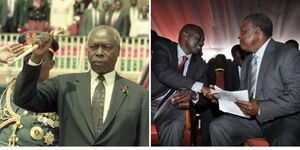A storm engulfed the Twitter community of bloggers allied to Deputy President William Ruto after the social media platform deactivated over 500 of their accounts in one sweep.
The social media platform suspended the accounts on the basis that they had flouted rules against misuse of hashtags as well as the use of deceptive links in an attempt to outsmart its algorithm.
An outcry then followed from some of the users who argued that they had lost a large chunk of their livelihoods, some of whom made as much as Ksh63,000 per month promoting brands and political slogans with their relatively popular handles boasting northwards of 100,000 followers.
Soon after, a finger-pointing game emerged directed to a somewhat obscure Excel sheet on which the influencers, who had been contracted to promote the hashtag #TheRutoPromise, had been required to update their details including a phone number, official names as well as the work they had done to facilitate their payment.
Instead of receiving money into their mobile accounts, the influencers were shocked to see their accounts disappear one by one in what they claimed to be a set up by one of the sector's players.
Speaking to Kenyans.co.ke, one of the influencers accused of engineering the takedown, however, distanced himself from the scandal arguing that their company had also lost money in the process and continued losing social media accounts in the days that followed.
He also pointed out that the social media influencing industry was a thin thread to walk on, especially during elections where there had been cases of unscrupulous opponents and clients reporting certain hashtags as violating community rules - leading to the loss of verification badges of accounts associated with it.
"We as a company didn't have anything to do with bloggers' accounts being suspended. That would be very unfair. I had a tag to run on Saturday and I didn't. I lost money as well as the influencers who had to work that day.
"Most of the accounts that were suspended was because of people crying wolf on whatever was out there on Twitter," the source stated.
Regarding the excel document, the influencer maintained that it was a standard procedure aimed at keeping a record of all influencers contracted at a given time since they are drawn from different geographical locations.
"The link was a document, Excel online document. For reporting details, I send you this form and you fill in your details as well as the number of tags as well as links.
"It facilitates a good reporting structure to track everybody who was engaged during the tag to ensure that they did what was required of them," he added.
With the loss of the accounts, many of those who worked on marketing Ruto have challenged the DP's digital team to make payments without asking for proof of links.
Kenyan Digital guru Brian Muuo opined that as the Kenyan election draws closer, political contenders are increasingly leaning on social media marketing on the hopes of influencing undecided voters hence the rise in the influencer economy.
"Political campaign teams from the top two camps, Azimio and Kenya Kwanza have recruited Digital media experts. They are running automated adverts on google and using influencers on Twitter, Facebook and Instagram.
"This helps them share their ideas, manifestos and live updates of their rallies. In some instances, these influencers are used to malign their opponents," Muuo stated
The deactivation comes even as the political fever pitch hits the country placing focus on social media platforms and their ability to influence the elections.
In 2019, Twitter banned political advertising globally noting that the team believed 'political message reach should be earned, not bought.'
Since then, the platform had also intensified its crackdown on the manipulation of hashtags for political gain which includes tweeting with excessive, unrelated hashtags in a single tweet or across multiple tweets.
In June, another popular social media platform, Tiktok, launched a crackdown on 130 videos found to have violated the platform's hate speech, incitement, and other political disinformation policies following research by Mozilla Fellow, Odanga Madung.
According to the research, some Kenyan accounts on the platform have been peddling political disinformation ahead of the August polls. The researcher noted that the 130 videos were linked to 33 TikTok accounts.












